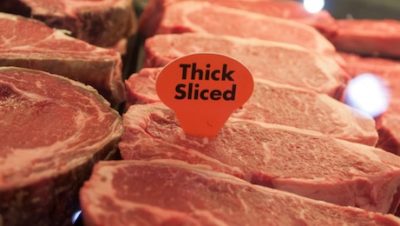By Daren Bakst | The Daily Signal
Over the past week, there have been two widely repeated myths regarding the meat supply amid the COVID-19 pandemic.
The first deals with Tyson Foods’ advertisement published in several newspapers. That otherwise important and well-written advertisement detailing concerns about the meat supply included a very unfortunate sentence that has been latched onto by the media: “The food supply chain is breaking.”
No, it isn’t.
Currently, supply disruptions exist in a narrow part of the food supply; namely, beef, pork, and poultry. As important as meat might be, it hardly constitutes the entire food supply chain.
That isn’t to understate concerns about the meat supply disruptions, which have been caused by coronavirus illnesses at processing plants. But it doesn’t help during this pandemic to give the impression that those concerns are representative of a larger food supply problem.

Currently, supply disruptions exist in a narrow part of the food supply; namely, beef, pork, and poultry. As important as meat might be, it hardly constitutes the entire food supply chain.
According to both the U.S. Department of Agriculture and the Food and Drug Administration, the U.S. isn’t facing a food shortage.
Even though Americans might be seeing some empty grocery shelves, this is generally a logistics and inventory problem, not a reflection of food shortages or a broken system. The food supply chain is very resilient, and given the magnitude and speed of unexpected market changes due to the coronavirus, it has responded extremely well.
Of course, as with the meat supply, all aspects of the food supply chain need to be closely monitored during the pandemic.
The second widely repeated myth is that President Donald Trump ordered meat-processing plants to remain open.
No, he didn’t.
It’s true that last week, the president issued an executive order to address meat-processing plants and the meat supply.
However, the executive order doesn’t require that plants must stay open (or reopen). It does apply the Defense Production Act to meat and poultry in the food-supply chain. That can trigger two powerful authorities under the law; namely, priority authority and allocation authority.
As The Heritage Foundation’s national defense expert, Thomas Spoehr, explains:
The priority authority allows the federal government to ensure the timely availability of critical materials and services produced in the private market in the interest of national defense, and to receive items through contracts before any other competing interest.
The allocation authority gives the president the power to allocate or control the general distribution of materials, services, and facilities.
In order to address meat supply concerns, the president delegated his power under the Defense Production Act, including those two authorities, to Agriculture Secretary Sonny Perdue.
Perdue is directed to “take all appropriate action … to ensure that meat and poultry processors continue operations” and “determine the proper nationwide priorities and allocation of all the materials, services, and facilities necessary to ensure the continued supply of meat and poultry.”
His actions, though, must be consistent with joint guidance from the Centers for Disease Control and Prevention and the Occupational Safety and Health Administration covering worker health and safety at processing facilities.
Whether the secretary does try to require plants to stay open remains to be seen. However, as of now, he hasn’t tried to do so. Stating that the executive order mandates that plants remain open is putting the cart before the horse.
Myths about the food supply only exacerbate the concern Americans have about meeting their households’ food needs during the pandemic. As we all make our way through this unprecedented time, we certainly don’t need misinformation making things worse.



Color me skeptical. I’ve seen information from other sources (none of which are anecdotal) that contest much of this. Elements of the federal government and of governments in states controlled by Democrats that the lockdowns are being used to move the country in the direction of the Green New Deal, also embodied in UN Agenda 2030. You can add Vermont to that; we are controlled by Democrats. Included in that is moving the population away from meat consumption. The shortages have just started and will become dire unless either the restrictions are lifted or private businesses rebel against the totalitarians.
I know an Angus rancher in Illinois who Is selling 60lbs of ground beef twice a week through a local farming group. sent three more to the “house” yesterday. grows all sorts of veggies too, and demand is high . Direct to consumer, phone in orders,no store shelves to paw over. Savvy entrepreneurs will find a way around the middlemen.
Thank you. I’ve already heard a listener exclaim on VPR that the workers are being “sent to their death” based on the President’s Executive Order. The reality is that, like other food and commodity items, consumer hoarding added to disruptions to the normal flow of products is causing high demand and low supply.
The results will hardly be felt in retail pricing, and farmers are already getting higher prices at the farm gate due to increased demand.